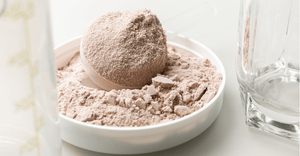How Much Creatine Should I Take? Here's What You Must Know
As you probably already know, creatine is one of the most popular and effective natural muscle-building supplements on the market today. However, many people start using it without understanding how much they should take for optimal results.
To get the most out of creatine, it's essential to know how much creatine you should take. Keep reading as we guide you to the right amount to take for optimal benefits.
What is Creatine?
Creatine is a naturally occurring compound found in the body. About 95% of the body's creatine is stored in muscle, where it plays an essential role in energy production. The body naturally produces creatine from the amino acids methionine, glycine, and arginine. (1)
It helps produce ATP (adenosine triphosphate), the energy source your muscles use during short, intense activities like lifting weights or sprinting. (2)
You can get creatine through foods like beef and salmon, but the amounts are relatively small. To match the levels provided by supplements, you'd need to eat an impractical amount of these foods daily.
That's why creatine supplementation is a convenient, fast, and effective way to increase muscle saturation. By quickly saturating your muscles, you can experience the benefits.
How much Creatine should I take?
Knowing how much creatine you should take is important to ensure you get maximum benefits without wasting any product.
The extensive scientific studies on creatine consistently recommend a daily dose of 3 to 5 grams. (3) This dose has proven to be the optimal amount for most individuals looking to maintain creatine saturation levels in their muscles.
It is optional to run a creatine loading phase. During this loading phase, you take 20 grams of creatine for 5 to 7 days. After this phase, you return to the daily maintenance dose of 3 to 5 grams.
The point of a loading phase is to rapidly saturate the muscles with creatine, meaning it will work faster. If you don't load, it will take slightly longer for you to experience the performance-enhancing benefits.
Creatine has to be taken daily, even on rest days. Dosing creatine daily is important because the body breaks down roughly 1 to 2% of the creatine pool per day (about 1 to 2 grams per day) into creatinine. (4)
Can you take too much Creatine?
If you're healthy, taking too much creatine is unlikely to cause any serious harm. Research has shown that creatine is safe even at high doses of 30 grams per day for periods of up to five years. (5)
Taking more than the recommended amount is unnecessary once your muscles are fully saturated, as your body will excrete excess creatine.
Excessive doses could also cause discomfort, such as bloating, cramping, or diarrhea. It's recommended to stick to the recommended scientific dosage of 3 to 5 grams daily after completing an optional loading phase.
If you have an existing medical condition, we advise you to consult your healthcare provider to make sure you can take creatine without any issues.
What the right amount of Creatine can do for you
Taking the right amount of creatine can unlock many benefits, helping you reach your fitness and performance goals. By enhancing your muscles’ energy production, creatine boosts strength and power, helping you lift heavier weights and perform explosive movements more effectively.
This increased workload stimulates muscle growth, helping you build lean muscle mass over time.
It also supports endurance by reloading your energy stores faster. This can be beneficial for any sport; with this additional energy, you can maintain high-intensity efforts longer. Proper creatine supplementation supports faster recovery between sets and workouts, reducing muscle soreness and allowing you to train harder and more frequently.
Additionally, creatine increases muscle volume by drawing water into your muscle cells. Your muscles will appear fuller and more pumped while also promoting hydration and cellular function.
Emerging research even suggests that creatine may enhance cognitive performance, particularly during fatigue or for individuals with lower dietary creatine levels. Taking creatine has many benefits, but make sure you are taking the right amount!
Tips for taking Creatine
Creatine is a fantastic supplement, and using it the right way can help you unlock its full potential. Here are several tips to help you get the most out of it:
Use the right form
As you may already know, there are different forms of creatine on the market. We recommend sticking to creatine monohydrate, which is backed by decades of scientific research proving its effectiveness and safety.
Creatine monohydrate is nearly 100% bioavailable, meaning your body can absorb and use it efficiently. (6) Plus, it is the most cost-effective option. Other forms, such as creatine hydrochloride (HCl) or buffered creatine, are more expensive but don't deliver superior benefits.
So, take creatine monohydrate for the best value and effectiveness.
Be patient
Creatine does not work instantly, so patience is essential as you wait for the effects to kick in. Generally speaking, it takes about one to four weeks for creatine to start working, depending on whether you do a loading phase or the standard daily dose.
If you want to see results, stay consistent and take your creatine daily, even on rest days.
Combine with proper training and nutrition
Creatine works best when combined with proper training and nutrition. Intense training allows your muscles to take full advantage of creatine's ability to boost strength, performance, and endurance.
Proper nutrition is equally important. You have to ensure you provide your body with quality proteins, whole-food-based carbohydrates, and healthy fats. Also, make sure to drink enough water while on creatine. Locking in both training and nutrition will amplify creatine’s benefits, helping you achieve maximum performance and recovery.
Conclusion: How Much Creatine Should I Take
When answering the question, “How much creatine should I take?” the science is straightforward. You should take a daily dosage of 3 to 5 grams of creatine.
However, if you want faster results, you can do a loading phase, taking 20 grams daily for 5 to 7 days to saturate your muscles quickly. After this, you return to 3 to 5 grams daily to ensure your muscles remain at optimal creatine levels.
Consistency is important when it comes to maximizing creatine’s benefits. You have to take it daily, as you need to maintain creatine saturation in the muscles. Make sure to combine it with a solid training routine and proper nutrition for the best results.
References
- Buford, T. W., Kreider, R. B., Stout, J. R., Greenwood, M., Campbell, B., Spano, M., Ziegenfuss, T., Lopez, H., Landis, J., & Antonio, J. (2007). International Society of Sports Nutrition position stand: creatine supplementation and exercise. Journal of the International Society of Sports Nutrition, 4, 6. https://doi.org/10.1186/1550-2783-4-6
- Saito, S., Cao, D. Y., Okuno, A., Li, X., Peng, Z., Kelel, M., & Tsuji, N. M. (2022). Creatine supplementation enhances immunological function of neutrophils by increasing cellular adenosine triphosphate. Bioscience of microbiota, food and health, 41(4), 185–194. https://doi.org/10.12938/bmfh.2022-018
- Buford, T. W., Kreider, R. B., Stout, J. R., Greenwood, M., Campbell, B., Spano, M., Ziegenfuss, T., Lopez, H., Landis, J., & Antonio, J. (2007). International Society of Sports Nutrition position stand: creatine supplementation and exercise. Journal of the International Society of Sports Nutrition, 4, 6. https://doi.org/10.1186/1550-2783-4-6
- Buford, T. W., Kreider, R. B., Stout, J. R., Greenwood, M., Campbell, B., Spano, M., Ziegenfuss, T., Lopez, H., Landis, J., & Antonio, J. (2007). International Society of Sports Nutrition position stand: creatine supplementation and exercise. Journal of the International Society of Sports Nutrition, 4, 6. https://doi.org/10.1186/1550-2783-4-6
- Kreider, R.B., Kalman, D.S., Antonio, J. et al. International Society of Sports Nutrition position stand: safety and efficacy of creatine supplementation in exercise, sport, and medicine. J Int Soc Sports Nutr 14, 18 (2017). https://doi.org/10.1186/s12970-017-0173-z
- Kreider, R. B., Jäger, R., & Purpura, M. (2022). Bioavailability, Efficacy, Safety, and Regulatory Status of Creatine and Related Compounds: A Critical Review. Nutrients, 14(5), 1035. https://doi.org/10.3390/nu14051035













Leave a comment